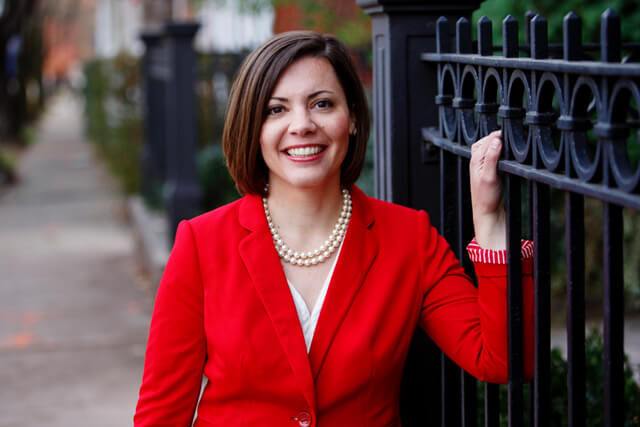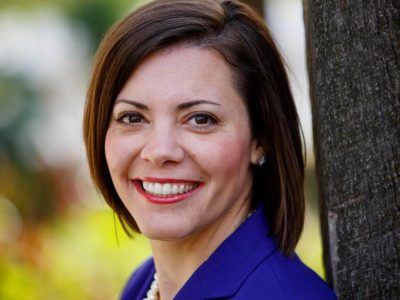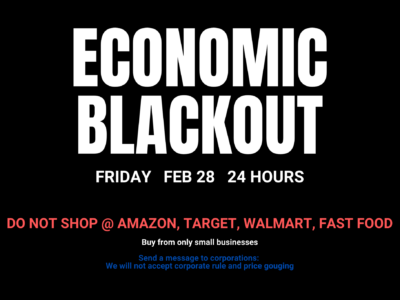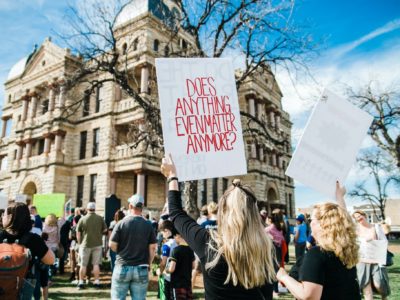Sometimes it’s about the journey. Even though Christina Hartman’s Congressional run in 2016 was unsuccessful, her experience running in a largely red district speaks toward the hope we should be feeling in the democratic political sphere right now. Though things seem to be broken beyond repair, we have a group of women like Hartman leading the charge towards something better, who aren’t afraid to say that it is harder for women, there is a double standard, but that we can stand against that because we can do the work. Her work in the nonprofit sector and international development speaks for itself and she is definitely someone to look out for come 2018.
Christina Hartman Career Timeline
1999 – Graduated from George Washington University with a B.A. in International Affairs
2004 – Graduated from Fordham University with an M.A. in International Political Economy and Development
2014 – Became an independent nonprofit consultant
2016 – Ran for the House of Representatives seat in Pennsylvania’s 16th District
Q&A with Inspirational Women Leader Christina Hartman

Q: How did you decide you wanted to run for public office? What inspired you?
A: I didn’t follow a typical political path, I did international development, which is inherently political work. I worked on human rights and I taught people around the world how to make their own democracy better. So I was never really politically involved in the United States. In fact, I always tell people I was never a registered democrat until 2012. I’d always worked for democrats and was always democratic leaning, but I was registered independent, just because of how I grew up.
In 2011 I was on a work assignment in South Sudan and it was the timeline—the Jerry Sandusky case was happening and at the same time Planned Parenthood was being attacked for like the 700th time. And I was watching it all unfold on Twitter in South Sudan and I thought to myself, “Why do I keep helping all of these other countries when I really should be helping my own because clearly everything is falling apart.”
So in lots of ways, the feeling that many people had in this country on November 9th of 2016, was the feeling that I had in November of 2011. I turned my attention home and started doing domestic work. I worked for a nonprofit that supported survivors of domestic violence, sexual assault, and child abuse, and I was keeping an eye on what was happening in my home district because one of my mentors told me I needed to run in my home district. At the same time, I found out that the incumbent in the seat was going to be retiring and so I decided to throw my hat in the ring.
Q: What did it look like when you first started your journey in politics? How did you shift your focus from international development? What were your first steps?
A: I’m the kind of person who, my goal when I was a young person was to become the CEO of a nonprofit. I had a strategy called “collecting tools for my toolbox” so I was looking for jobs that would allow me to enhance my skillset and increase my skills so that they would contribute to me being a good CEO someday. I did operations, I did programming, I did advocacy, I did communications and marketing-type stuff, I did fundraising.
That just happened to be a really perfect skillset for someone who wanted to run for office because I was well steeped in policy, I’m a policy junkie. So I’m a political junkie and I had the skillset of a CEO, so I already had that skillset. For me it was a very natural transition.
Q: Can you talk to me a bit about some of your development initiatives? How did you get involved?
A: In January 2014 I went out on my own to do independent consulting so now I support nonprofits to do strategic planning, fundraising, and management things. It varies from job to job. But I started out at Freedom House and I was an executive assistant. I was working for a woman who had previously been a political appointee in the Clinton administration, so she knew everybody, so I got to sit in the room that I probably shouldn’t have been otherwise, but I was the notetaker at the time. And this was someone who provided me with ample opportunities so I got to help her write op-eds and things like that when I was 23 years old.
So I got a lot of exposure early on just being an executive assistant and then I moved on to things like event planning and doing things like that and then I moved on to doing operations work in the field so I worked in central Asia. Then I ran a youth leadership program in sub-Saharan Africa for a few years and then I moved to the U.K. I worked with Prince Charles’ main charity, The Prince’s Trust. Many of the organizations that I worked for were very buttoned-up organizations. They were really good with branding and marketing. They thought very highly of themselves so they always presented well. So I was learning those things along the way.
Q: How would you say that your experience in the nonprofit sector shifted and became part of your political platform?
A: Pennsylvania 16th is just outside what’s considered the Philly-metro area. Often people know us because of the Amish, so we’re often seen as a super red area and an area that’s, let’s be honest, has been controlled by a republican man since the 1800’s.
I had to run a really untraditional campaign. The folks in D.C. then were not interested in me. I had to use my nonprofit skills to actually do some of the work. I had to build a case. A lot of life is like being a lawyer, you have to build the case for why it should be. And then the other part is fundraising, which is selling the case—to sort of change the narrative and convince people that this was in fact, doable.
I ran the numbers for all the seats that had been won recently by democrats in the area or that had come close. I went through previous elections and ran numbers and started to figure out, was this really possible. I took that data and the other trends that I was seeing and just my gut instinct about that area and I created this narrative, and that’s where my fundraising skills were helpful because I was able to create a narrative that I was able to sell to other people.
Q: How would you say that your experience in your undergrad and getting your master’s helped you prepare for your experience in public service?
A: From a policy perspective, because I was doing international affairs—I mean, it’s a little scary because so many of the things that I was studying at the time are now coming to pass. NAFTA was implemented at the time, NAFTA was implemented when I was in undergraduate school. Sort of the fallout from NAFTA, some people blame the Trump presidency, blame the election for folks who have been disaffected by NAFTA.
More recently, with the whole Russia piece—it’s so interesting to me because right now I basically feel like I’m stuck in my 1995 international affairs class—International Affairs 101 with Henry Nau at GW. A lot of my schooling has helped me, unbeknownst to me, until now, in a way. You just don’t know what you’re learning when you’re learning it and how it’s going to become useful to you later on and it may only become apparent 20 years later.
But besides that, I went to GW, so if they don’t already they should have an award for being the school that gets the best internships—the school that’s internship heavy. We lived next to the White House, we interned at the White House, we interned at the state department—that’s a very GW thing. I stayed every summer, and my first internship was at the department of housing and urban development, which I actually got through a babysitting job.
Some of the best advice that I can give—if opportunities present themselves, don’t sell yourself short, but also, if a door opens, walk through it. Embrace things and say yes.
Q: How do you think having more women run for office will end up shaping the political sphere in this country?
A: What year is this? 2017? I’m so excited for 2037—it’s going to be frickin’ awesome. Part of it is that, I think women my age, or people like me were like, “Oh, America’s democracy is kind of ticking along. I don’t really need to participate.” And then a bunch of us just went, “Oh wait, that’s not true.” There’s a lot of women who think they’re not smart enough not just to run for office, but to even engage in policy. What I want to do is encourage women to feel like they have enough smarts to do this.
If you’re 40 plus, you’re scratching your head and going, “Seriously? Do we have to do everything? We cook, we clean, we take care of the kids, and we work, and now we have to do politics because you people are messing it up so badly.” And then for younger women I would say it’s a great opportunity to get involved in your community. So if we say generally millennials are all about community and engagement, then this is a great way to do that and to know who your neighbors are and know what’s going on in your community. I mean, we don’t have to be afraid of terrorists living in our neighborhoods if we know all of our neighbors.
I think there’s great hope and I’m really excited for the future and I know that women always bring their best game to the table because we have to—as we’ve seen with Hillary, the double standards. The double standards will never go away. We always bring our double-A game to everything. We work harder and we generally are stronger and we’ve been through more stuff. And I don’t say that to be disrespectful to guys who are doing a great job, I just mean, it will always be unbalanced.
As long as we keep raising sons and daughters in the way that we do, in which daughters are always expected to outperform, we will always have this inherent Trump-Clinton thing where boys efforts will always be enough and girls will never be enough.
Q: Were there any particular challenges that you face particularly as a woman running for Congress?
A: I can’t be sure that it was because I was a woman because my district was a hard district. People didn’t get behind me until late. In the end I think that a lot of folks in the more rural areas of Pennsylvania still don’t think that it’s appropriate to have a woman in charge in politics. And those people might not vote for me anyway, but that’s one of the things that I think we’re still up against.
Q: How did you gather the support and endorsements you needed to actually run?
A: The basic rule of thumb is that you start local and then you go to the state and the national level. I met with everybody at the local level who was important to the local parties, the local committees. I met with existing electives who were democrats—county commissioners and folks like that, state reps who are democratic and in the district. I told them what I wanted to do, I asked for their advice, and asked them if they would support me.
I was very lucky in that they were excited about me, they saw me in the places where I should be, speaking in the community. I was at events where they were at and they were like, “Wow, she keeps showing up.” My favorite comment from the campaign was, “Christina, are there three of you because you’re everywhere.” Thankfully, social media also allows us a bit of that aura as well.
So working the connections I had, not that I had tons of connections, but working the connections that I had, and not being afraid to ask, of course. You have to ask. You have to ask for endorsements, you have to ask for money.
Q: Is there a particular moment in your career that you’re most proud of?
A: I mean, I am so proud of what we did in 2016. Technically we lost, but oh my gosh did we win. I took from a district that was considered “safe republican” and we made it a toss-up. The republican super-PACs spent $1.1 million to smear me. We got endorsed by Emily’s List, by the DCCC, and then in January we were put on the DCCC’s target list for 2018. These were things that were literally unthinkable in January of 2015.
What we did was we changed the narrative and we gave people hope and we said that, “No, this isn’t a done deal. You don’t just have to go along with this and republicans actually have to listen to you.” That was something that was a big deal.
How to Become a Powerful Woman Leader
1. Enter the inner circle
“Politics is inherently ego-driven and everything is political. Imagine working inside a political organization. It’s not just like the regular, “Oh, everything’s political.” It’s a bunch of people who actually like that stuff,” said Hartman. “That creates a dynamic that’s sometimes hard to navigate if you aren’t familiar with it.”
2. Observe and participate
3. Stick with it
“Don’t be discouraged, because you will have—and even on the democratic side, let’s be clear—a bunch of people telling you that you can’t do it,” said Hartman. “Stay the course and do what you want to do. Build your groups of allies. Prove yourself. Do something. Do something that proves to people that you actually want to do this and that you’re capable and good.”
How to Connect with Christina Hartman
Send her a message: http://christinamhartman.com/contact/



















